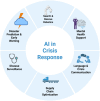AI in humanitarian healthcare: a game changer for crisis response
- PMID: 40673211
- PMCID: PMC12263676
- DOI: 10.3389/frai.2025.1627773
AI in humanitarian healthcare: a game changer for crisis response
Abstract
Artificial Intelligence (AI) is transforming humanitarian healthcare by providing innovative solutions to critical challenges in crisis response. This review explores peer-reviewed literature and case reports from 2001 to 2025, retrieved from PubMed, Scopus, and Google Scholar, using targeted keywords. Results indicate that AI enhances disaster prediction, disease surveillance, resource allocation, and mental health support through tools such as machine learning, natural language processing, robotics, and blockchain. Prominent applications include AI-powered early warning systems, chatbots for displaced populations, telemedicine platforms, and automated supply chain logistics. Ethical concerns such as data privacy, bias, and access inequities remain critical to responsible deployment. By uniting governments, NGOs, and technology providers, AI serves as a powerful tool to strengthen humanitarian healthcare systems, enhancing resilience and efficiency while ensuring better outcomes for vulnerable populations during crises.
Keywords: artificial intelligence; crisis response; disaster management; ethical considerations; humanitarian healthcare.
Copyright © 2025 Haykal, Goldust, Cartier and Treacy.
Conflict of interest statement
The authors declare that the research was conducted in the absence of any commercial or financial relationships that could be construed as a potential conflict of interest.
Figures
Similar articles
-
Integrating artificial intelligence in healthcare: applications, challenges, and future directions.Future Sci OA. 2025 Dec;11(1):2527505. doi: 10.1080/20565623.2025.2527505. Epub 2025 Jul 4. Future Sci OA. 2025. PMID: 40616302 Free PMC article. Review.
-
Ethical considerations for artificial intelligence in dermatology: a scoping review.Br J Dermatol. 2024 May 17;190(6):789-797. doi: 10.1093/bjd/ljae040. Br J Dermatol. 2024. PMID: 38330217
-
The revolutionary impact of 6G technology on empowering health and building a smart society: A scoping review.Comput Biol Med. 2025 Aug;194:110496. doi: 10.1016/j.compbiomed.2025.110496. Epub 2025 Jun 5. Comput Biol Med. 2025. PMID: 40479789
-
Workshop summaries from the 2024 voice AI symposium, presented by the Bridge2AI-voice consortium.Front Digit Health. 2024 Oct 30;6:1484818. doi: 10.3389/fdgth.2024.1484818. eCollection 2024. Front Digit Health. 2024. PMID: 39540145 Free PMC article. Review.
-
Ethical Guidance for Disaster Response, Specifically Around Crisis Standards of Care: A Systematic Review.Am J Public Health. 2017 Sep;107(9):e1-e9. doi: 10.2105/AJPH.2017.303882. Epub 2017 Jul 20. Am J Public Health. 2017. PMID: 28727521 Free PMC article.
References
-
- Abdul S., Adeghe E. P., Adegoke B. O., Adegoke A. A., Udedeh E. H. (2024). Ai-enhanced healthcare management during natural disasters: conceptual insights. Eng. Sci. Technol. J. 5, 1794–1816. doi: 10.51594/estj.v5i5.1155 - DOI
-
- Abdulhaq B., Hammouri M., Abu Hawas D., Dardas L. A. (2024). Exploring vaccination challenges among Syrian refugees in Jordan: insights from Camps and communities, and perceived parental barriers to childhood vaccination uptake. Vaccine 12:133. doi: 10.3390/vaccines12020133, PMID: - DOI - PMC - PubMed
-
- Abraha D. T. (2025). Blockchain-based solution for addressing refugee management in the global south: transparent and accessible resource sharing in humanitarian organizations. Front. Hum. Dyn. 6:1163. doi: 10.3389/fhumd.2024.1391163 - DOI
-
- Afolabi A. I., Hussain N. Y., Austin-Gabriel B., Ige A. B., Adepoju P. A. (2023). Geospatial AI and data analytics for satellite-based disaster prediction and risk assessment. Open Access Res. J. Eng. Technol. 4, 058–066. doi: 10.53022/oarjet.2023.4.2.0058 - DOI
Publication types
LinkOut - more resources
Full Text Sources


